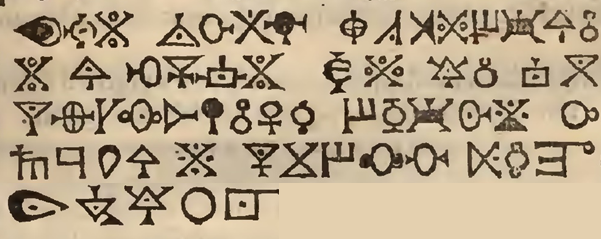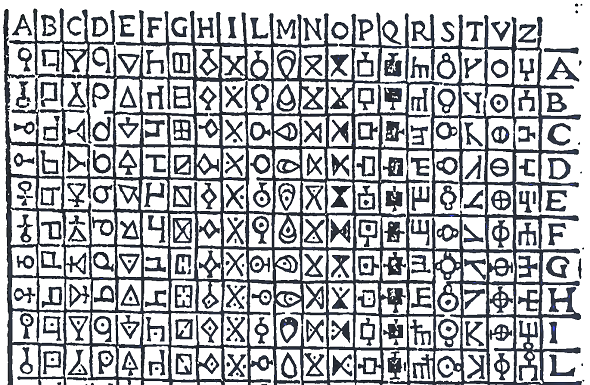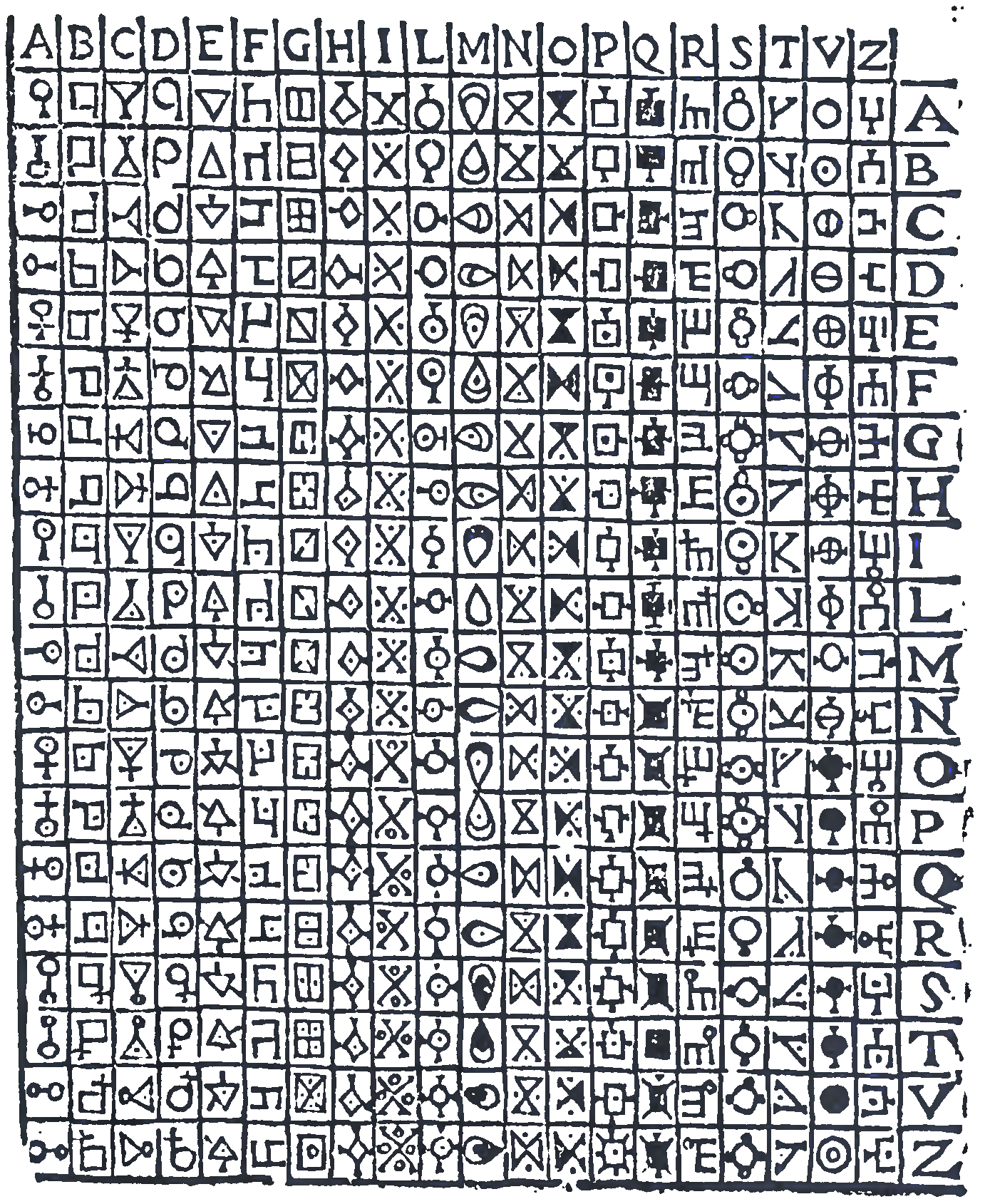Last December, Jarl Van Eycke and Louie Helm solved a bigram-substitution ciphertext consisting of 750 letters – a new world record was reached. Now I have created a 600-letter bigram challenge. Can it be solved, too, or have we reached the end of the line?
The bigram substitution is a manual encryption method with a history of over 500 years. A bigram (also known as a digraph) is a pair of letters, such as CG, HE, JS or QW. The number of bigrams in the Latin alphabet is 26×26=676, ranging from AA to ZZ. A bigram substitution replaces each letter pair with another one (or with a symbol or with a number between 1 and 676). In order to use a bigram substitution, we need a substitution table with 676 entries.
Porta’s bigram substitution
The earliest bigram substitution I am aware of is described in the book De Furtivis Literarum Notis written by 16th century cryptologist Giambattista della Porta. For his 20 letter alphabet, Porta created the following substitution table with 400 entries:
Here’s a ciphertext Porta introduces in his book:

This cryptogram decrypts to the following Latin paragraph:
MVLTIS CLADIBVS VLTRO CITROQUE DATIS ET ACCEPTIS, VNIVERSA PENE CIVITAS OCCVPATA EST, RELIQVA NON SCRIBAM, SED IN CONGRESSVM NOSTRVM RESERVABO.
I have never seen a translation of these words and my Latin skills are not sufficient to do the translation myself. Can a reader help me out?
Porta substituted each letter pair with a symbol, which means that he had to be quite inventive to come up with 400 different symbols. For instance, the bigram IA is replaced with a symbol that looks like an X. The bigram VO is substituted with something resembling an O. Later users of the bigram substitution preferred to replace bigrams with multi-digit numbers or with bigrams.
My first two challenges
As far as I can tell, the best approach to attack a bigram substitution is hill cimbing. However, this technique will only be successful if there is enough material to analyze, i.e., if the ciphertext is long enough. But how long is long enough? Not much has been published about this question in the literature. In order to take a first step to find the answer, I decided to create a challenge. I took two messages – one with 2500 and one with 5000 letters -, encrypted them with a bigram substitution and published the result on my blog.
Within a few days, blog reader Norbert Biermann found the solution of the 5000-letter version – still with a few mistakes – using hill climbing. Thomas Ernst published a few interesting word pattern considerations. Then Norbert provided a second, more sophisticated hill-climbing result, which was almost error-free. Finally, Armin Krauß published the correct solution.
After the solution of the 5000-letter challenge had proven quite difficult, I expected that the 2500 letter ciphertext would not be solved so soon. I was wrong. Only a few days later, Norbert Biermann published the correct solution of the 2500-letter challenge, which he had again found with his hill climber. To my knowledge, this success represented a new world record in breaking bigram substitutions.
The Bigram 1346 challenge
Two years after Norbert’s record, I published another bigram challenge on this blog. This time, I took an English text constisting of 1346 letters as plaintext, calling the result Bigram 1346 challenge. Contrary to the first time, I didn’t replace bigrams with numbers but with other bigrams. In August 2019, Norbert Biermann published the solution of the bigram 1346 challenge as a comment on my blog. With this success, Norbert set a new world record for the shortest bigram ciphertext ever broken.
The Bigram 1000 Challenge
After Norbert had broken the Bigram 1346 message, I decided to create another, even shorter challenge. This time, I took a plaintext with exactly 1000 letters. I encrypted it in the same way as the Bigram 1346 plaintext, calling it Bigram 1000 Challenge. Again, the challenge was broken and a new world record reached. This time, the solution came from Jarl Van Eycke and Louie Helm. They used highly sophisticated hill climbing techniques.

The Bigram 750 Challenge
After Bigram 1000 had been solved, I couldn’t help creating a new, even tougher challenge, the Bigram 750 challenge. Again, it was solved by Jarl Van Eycke and Louie Helm. To date, this success represents the world record in breaking bigram challenges.
The Bigram 600 Challenge
Today, I’m presenting the Bigram 600 challenge. As the name suggests, it consists of 600 letters:
UGBZAEHINYQLBPZLNFTLUEBMULTLSLZPBZPZKPOVUGYSQPNYHL RYFHATQKRHTZEHPDQUUGYSUJOVYTUGYVRHAJNFTLUEXFRUEOOJ TZOSLUPZEICVADYMYLCRBZXOUGSVDJOIDYRHTZOSWZROYNKJRM EIXOREOVNFTLUESAMNDJHIIWJGKRYFUBTIQPULBPRMJORECJCY WZZPQRXXVNOSZLBLNYJMPLYNOVLCLKIOGUKUKFSAKAQRSVQXUJ IOANYSWZSDKUKFLNRMEIRJYVEOLXLKMEYKERHXZPBZXOZXQPCR KSYOSVHNTLIXKRYFUBTIMGWIZLOSONRMIDKYNYLCFFOMTTLLJH WTADHLYNRHMZADOGMUKBWZZPPQBZBZNOCRHINYNFTLUEYNOVBZ NOQPGCQMRHTZIDKYNYCRBZXOUGSVTTQPOSDYXOMQKKVNEALUYV RMUFPYNXZAVLRHTZNYQXMFYVUCMZSAJMBZZPXPBZMNVFUCJTNY QXGHEITPPYFWKUZFPZQUDEVLDBOMGRUEKFSCYTVNANLDRMNBYV UTFNUJMUMMEOIXIISDVNZPMNRYRCTFUGZPDNUTLXJNSSVNCRJC
Bigram 600 is a ciphertext made with a bigram substitution. The plaintext is in English. Can a reader break Bigram 600? If so, they will set a new world record.
As mentioned above, there’s another bigram-related question I would like to have answered: What does MVLTIS CLADIBVS VLTRO CITROQUE … mean? Any help is welcome.
Follow @KlausSchmeh
Further reading: Can you solve this Cold War encryption challenge?
Linkedin: https://www.linkedin.com/groups/13501820
Facebook: https://www.facebook.com/groups/763282653806483/




Kommentare (1)